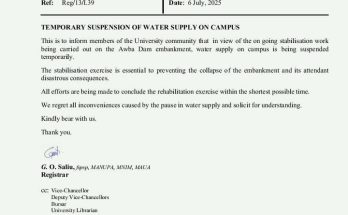Transportation, the movement of people, animals and goods from one location to another, for as long as one can remember is one of the oldest activities man engages in. From the beginning, which is humans walking and swimming as the only means of transportation to their destinations, to the introduction of animals like horses, oxen and donkeys up to the latest advancements we have now, transportation has been very essential to humans.
There is nobody that can deny the essentiality of transportation.
There is no place that road transportation is not needed. People use it in getting to work, school and other places. For students within the university community, it is very essential. Whether private or public, students rely on road transport and in most cases, about 90 percent of the student population relies on public means of transport. An important reason why this means of transportation is so crucial is to help students get to classes early and with much convenience. It also makes it easy for students with luggage to transport them to within and outside their various halls of residence.
What happens if the transport system in a university community has lots of loopholes? How will students fare if the drivers who provide these services decide to operate in their own world? Who will curb their activities if they decide to act like nobody cares? These questions and more run through the mind of students of the prestigious University of Ibadan when thinking about the transport system.
In the recent scope of transportation in University of Ibadan, it is noted that movement of students from some major areas of the school to other areas is in a very unimpressive state. For example, students of Obafemi Awolowo Hall find it very difficult to get transport from their hall to their lecture halls and vice versa. This also applies to students of Idia Hall. This is caused by the selective attitude drawn by cab drivers towards going to these halls. Students that stay off-campus are also faced by this challenge caused by the selective attitude of the cab drivers who for their selfish motives do not make transport readily available for students of the Faculty of Technology, Department of Mathematics, Statistics and Archaeology. It is unfair that because these drivers do not want to go to these areas force students to walk long distances to their destinations, mostly classes and it leaves them tired.
Also, the non-chalant attitude put up by the cab drivers towards students who are in a rush to get to class is quite appalling. For a cab driver to insist- although his cab is full- that he will not move – despite students pleas- until his colleagues queued in front have loaded fully and moved speaks volume about how little cab drivers care about the students they are actually providing services.
Recently, the transport committee did a review and passed a memo on new regulations about transport rules and fares in the university. It however seems the new fares exists only on paper because it is not been followed by the cab drivers. Instead they pick fights with students who challenge them. Apart from the fact that these cab drivers do not follow these rules, they have also devised a way of ”robbing” students of their balance, mostly ”ten naira”. It may seem little but sometimes, some people cannot afford it. The displeasing fact is that most times, these men have the balance but they do not, for reasons best known to them, part with it.
Several promises have been made to fix the non-availability of cab to students in Obafemi Awolowo Hall, Idia Hall, Faculty of Technology, Department of Mathematics, Statistics and Archaeology but nothing has been done. The question to be answered now is what are the steps being taken by the Students’ Union Executives and the transportation committee to attend to this strain?


